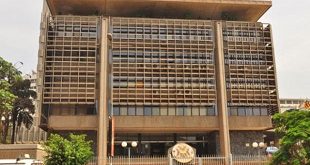
By Yoga Adhola
The debate Mwenda has started raises questions about whether the Luweero war was necessary
In his article, “On the NRM delegates conference” (The Independent, Monday, 01 December 2014 ), Andrew Mwenda has written things which make me reflect on my short membership of the Front for National Salvation (Fronasa), the forerunner of NRM as well as my departure from Fronasa in the mid-70s.
When Idi Amin toppled President Milton Obote in 1971, I was at the University of Nairobi. From Nairobi I did not go back to Uganda; I went to Dar es Salaam where things against Amin were happening. Obote, who was there and Tanzanian President Julius Nyerere had sworn to resist Amin. In Dar es Salaam, I found my contemporaries who had attended the University of Dar es Salaam such as Yoweri Museveni talking a language way beyond my comprehension. The University of Dar es salaam in those days was teeming with left-wing academics and some of the courses had prepared those who had gone there with an ideology which was totally out of reach to those of us who went to the University of Nairobi or Makerere.
I quickly began to work on catching up. I bought and borrowed books, and soon levelled out with the Musevenis. This came when I studied the writings of Jules Régis Debray and Franz Fanon. I came to the view that the ideology Museveni was mouthing was the right one for Uganda. I, therefore, left UPC and joined Fronasa, becoming a member of its Central committee.
However, as I studied further, and particularly when I read “New Theories of Revolution” by Jack Woddis, I came to realise the inadequacies of the theories of Régis Debray and Franz Fanon. At that point I left Fronasa and returned to UPC.
I had come to realise that the ideology that Museveni embraced was infantile and could neither explain the situation in Uganda nor offer solutions. I realised that the position of UPC and Obote reflected the true situation in Uganda. That Obote reflected the objective situation in Uganda is reflected in what Mwenda is saying; that Museveni has over the years gravitated to the same position that Obote held.
Andrew Mwenda wrote: “I am not sure whether he realises that on nearly every single issue that he criticised Obote – tribalism, corruption, “desire” to stay in power etc – (Museveni) has over time tended to gravitate to the same position and worse.” The list is much longer than what Mwenda has put out here. We shall run through a few. In an address at the University of Dar es salaam on July 11, 1986, Museveni said: “Instead of producing wealth for the benefit of Africa, we started producing for the benefit of Europe. The Europeans have gone through several revolutions while we have been marking time as we say in the army: we have stood still. We have been independent for twenty five years, so why has this situation persisted? Soon after independence there should have been dramatic change. One factor was the ideological outlook of the independence politicians.”
Museveni has now been in power for almost 30 years and the change he was castigating Obote for not carrying out – in eight years – has not occurred.
At the same address Museveni also said: “Point number four is about national independence. If a country is not independent politically, if the leaders cannot make their decisions without being pressured by outside powers, then that nation cannot solve its problems. Whatever solutions you adopt will be solutions in the interests of other forces. We are very conscious of this point because we have been living under leaderships that were subservient to foreign interests.” When addressing the 5th anniversary of the NRM on January 26, 1991, Museveni said: “It is for that reason that we asked ourselves the fundamental question–what kind of economy should this country have?” In his book; ` Sowing the Mustard Seed’, on page 47 Museveni wrote: “On December 19, 1969 there was an assassination attempt on Obote as he was leaving a UPC conference in Kampala. Amin was present, wearing the UPC colours–that is the way the army behaved in those days-….”
In the very same book on page 40 Museveni wrote: “On top of this, the army became virtually a wing of UPC with army officers wearing UPC colours.”
Here Museveni is criticising Obote for getting the army involved in politics. However, whatever Museveni is accusing Obote of is absolutely nothing compared to what happens in Museveni’s Uganda today.
On the same page of the same book, Museveni wrote: “Another principled politician of the period was John Kakonge who had been UPC Secretary-General, but he seems either to have been weak-kneed, politically inept, or both, because he had allowed himself to be cowed by Obote’s blandishments and intrigues. The whole of the 1960s decade in Uganda’s political life was a period of intrigue, culminating in Obote virtually abandoning power to Amin. These intrigues among politicians had so weakened mass movements such as DP and UPC that Amin just picked up the mantle of power from a political leadership emasculated by its own ideological narrowness and its unprincipled conduct of state and political affairs.” This statement speaks for itself and so needs no comment.
In the same book Museveni also wrote on page 44: “Without national unity, the different petty bourgeois factions (traditionalists, parvenus, and religionists) were all competing for what were in effect imperialist favours. This relegated the evolution of a national strategy for disengaging from imperialism to the back burner. In fact, people like Obote did not comprehend the workings of imperialism in the neo-colonial phase.” If by implication, Museveni’s argument means he understood, we remain to ask: how come the person who understood, is not only far from disengaging from imperialism but has become the best ever agent of imperialism in the region?
We should also bear in mind that imperialism overthrew Obote in 1971 and it is imperialism that has substantially kept Museveni in power over these years. They have done so because he is very useful to them. What then is the lesson we get from this debate that Mwenda has begun? In the first place, there should not have been any Luweero war if the results were going to be what Mwenda is talking about; that is Museveni ending up doing what he criticised Obote for. Did we have to have all those people (mark you from both sides) die just so that Museveni would end up doing what he went to war against? Or did Museveni just want to be the President whatever the cost?
Not to blow my own trumpet, but I did realise this more than 30 year ago and that is why I left Fronasa and returned to UPC.
Secondly Museveni keeps boasting of defeating Obote and UPC in the war; however, what defeat is this if Museveni ends up politically in the same camp with Obote? Should we say that Museveni probably won the battle but lost the war?
 The Independent Uganda: You get the Truth we Pay the Price
The Independent Uganda: You get the Truth we Pay the Price




I’m an African, and a Ugandan at that. When I see what is happening now-I’m 70 years, I think that we Africans are humans of a lower caliber. Look at what is happening in Haiti-again in South Africa.
I was one of those with Museveni until 1989-but I saw things changing after cadet 4 in 1986.
Jesus Christ is number One in my life. That is why I Trust Him.
God bless us all.